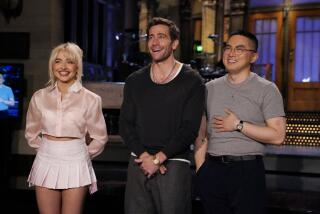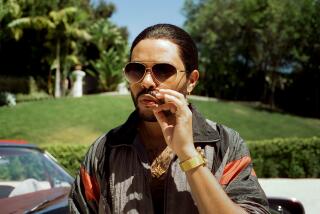Drawing on their theatrical instincts
- Share via
One enlightening aspect of a season’s worth of “Idol” viewing is the sensation of having your most strongly held opinions slip right out from under you. Unless you’re a prognosticative whiz or a natural-born child of the middle of the road, it’s likely that your early favorite will get voted off soon enough, forcing a change in loyalties. Add in the effect of hype and the human evolutionary desire to be on the winning side of a fight, and that contestant you despised may convince you soon enough that he’s OK -- no, better than OK, he brought the molten hot lava tonight, dog (you’re soon shouting), I’m voting for that guy!
This pattern contradicts the conventional view of music fanship, which romanticizes the loyalty that inspires Joe Blow to buy Springsteen tickets every summer for 27 years. But it is a lot like how most people experience mainstream pop. Hit songs become quick favorites, then fade, replaced by something else; often, a marketing twist or some personal circumstance of listening -- dancing with a new date, say -- can turn an irritating hit into something beloved.
The same goes for artists; the longer they manage to hang around, the more likely they’ll do something to convince naysayers they’re worth a 99-cent download. Think of all those hip-hop fans who turned on to Mariah Carey after “Honey,” or the John Mayer haters who reconsidered after he starting doing comedy with Dave Chappelle. Like fashion, its sister art, pop schools its acolytes in the art of consumption, and any student of capitalism knows that we have to keep switching up our purchases to keep the monster alive.
“Idol” also forces this realization, brutally, and ever more so as the field narrows and clear crowd favorites emerge. This brings me to my conversion narrative. Readers of this humble column know I hated the Davids when Season 7 began -- Archuleta seemed to me a frustratingly opaque showbiz kid, while Cook seemed cut from the fake-grunge cloth of the many KROQ favorites I dread. But I’ve totally come around, especially after Tuesday night’s Andrew Lloyd Webber challenge. Davids A. and C. ran this gantlet with by-now predictable flair, making me begrudgingly love them all the more.
I can’t predict who will have been eliminated by the time you read this, but I can say this: Webber’s compositions, which played a key role in defining theater music (and, some would say, schmaltz) in the age of rock, proved extremely challenging for the Final Six. These aspirants are too young to have experienced classic rock firsthand, and few seem to have spent any time in a theater that wasn’t a converted high school gym. So they had little chance of grasping Lord Webber’s potent blend of angst and artifice, much less displaying the vocal precision theater (as opposed to Top 40 stardom, for which there is auto-tuning) requires.
Winners and losers
The night proved beneficial for one contestant: Syesha Mercado, whose acting experience finally made a difference. This jazzy gal’s early turns this season received harsh judgments precisely because they were witty and highly cultivated -- more like theater than pop, in fact -- and she’s been slumming with the Whitney imitators ever since. Tuesday she vamped through a number from Webber’s roller-skating extravaganza, “Starlight Express,” even getting band leader Rickey Minor to play Fred Astaire for a hot minute. And Simon called her “sexy”! She’ll never get a chance like this again; good for her that she worked it for every available ounce of pizazz.
Others fumbled where Mercado finger-snapped. Brooke White flubbed her “Evita” ballad’s opening and careened through the rest as if her foot were stuck on the ignition pedal. Jason Castro sweetly flubbed “Memory,” a song that’s a standard stress test for any diva, but hardly appropriate for the boy angling to replace Ashton Kutcher as America’s favorite doofus. I liked his version -- he sort of turned it into a Leonard Cohen song -- but the judges, predictably, slaughtered him.
Carly Smithson had fun with the title song from “Jesus Christ Superstar,” but it seemed like a missed opportunity. “JCS” is the third-greatest rock musical (behind “Hair” and “Hedwig and the Angry Inch”), and its signature ballad, “I Don’t Know How to Love Him,” would have been the perfect vehicle for Carly to show her unusual talent for bridging the gap between Ann Wilson and Celine Dion. Instead she chose a number more suited to a choral group than a soloist, and then nearly handed it over to the show’s backup singers.
Only the Davids showed the ability to think beyond the terror (or, in Mercado’s case, comfort) Webber’s songbook clearly induced. They did it by relying on the same best qualities that lift them every week. Archuleta showed off his musical sense, finding an unexpected groove in one of Webber’s semi-classical arias, “Think of Me.” Gliding into that downy-soft upper register, he made the song a secret mash-up with Babyface’s “The Loneliness.” Archie may be the show’s youngest prime competitor, but that’s not stopping him from being the most sophisticated.
In fact, musical savvy is the main quality he shares with his rival, Cook. The rocker offered a new slant on his patented inventiveness this week by letting loose the drama club kid within. Taking a chance on “Music of the Night,” West End legend Michael Crawford’s big number from “Phantom of the Opera,” Cook neatly balanced restraint with a few careful, but still glass-shattering, high notes.
It would have been easier for Cook to follow Smithson’s lead and slay on one of those wailers from “JCS,” but his stylistic about-face had far greater impact. It even raised the specter of a future supergroup -- David Cook and noted alternative-rock fan Josh Groban, jamming on a medley of Andrew Lloyd Webber and Linkin Park. That would be great for next year’s “Idol Gives Back”!
--
More to Read
The biggest entertainment stories
Get our big stories about Hollywood, film, television, music, arts, culture and more right in your inbox as soon as they publish.
You may occasionally receive promotional content from the Los Angeles Times.








